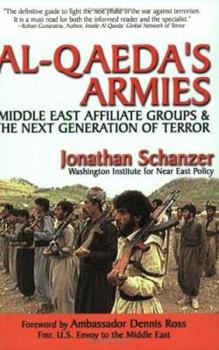Al-Qaeda's Armies: Middle East Affiliate Groups & the Next Generation of Terror
Select Format
Select Condition 
Book Overview
Al-Qaeda still threatens the West despite the fact that thousands of its fighters have been killed or captured. Attacks continue, even as Usama bin Laden and his top lieutenants hide in distant caves.... This description may be from another edition of this product.
Format:Paperback
Language:English
ISBN:156171884X
ISBN13:9781561718849
Release Date:September 2001
Publisher:Washington Institute for Near East Policy
Length:222 Pages
Weight:0.80 lbs.
Dimensions:0.7" x 6.9" x 8.6"
Customer Reviews
1 rating
Surveys the most notorious affiliates of Al-Qaeda in the Middle East
Published by Thriftbooks.com User , 19 years ago
Al-Qaeda's Armies, in which this reviewer is thanked in the acknowledgments, surveys the most notorious affiliates of Al-Qaeda in the Middle East by which Schanzer means "homegrown, organic Islamist terror groups with nationalist objectives" that have been trained by Al-Qaeda in Afghanistan and elsewhere. Additionally, affiliates "communicate with Al-Qaeda's command structure ... share Al-Qaeda's ascetic and militant approach to the implementation of Islamic law, and their shared goal of world Islamic dominance." Following September 11, 2001, Al-Qaeda metastasized from a hierarchal and centralized organization into a decentralized movement; Schanzer explains how it adjusted to this new reality by relying to a large degree on the infrastructure of surviving affiliate groups. These affiliates, Schanzer argues, represent the next generation of the global terrorist threat or stated differently, Al-Qaeda 2.0. Schanzer predicts that "affiliates will increasingly constitute Al-Qaeda's outer perimeter and the pools from which new terrorists can be drawn." He provides exceptional perspective on affiliates in Egypt, Lebanon, Yemen, Algeria, and northern Iraq. Additionally, the book includes information on their evolution, their activities, and offers a convincing strategy for the United States and its allies to deal with this menace. Often overlooked because of their small size and because they operate in areas outside the reach of state authority, the affiliates' activities should sound alarm bells in Western capitals. To defeat Al-Qaeda requires a two-pronged approach: hunting the central leadership and the affiliates. Undertaking a strategy of combating affiliates would certainly yield much needed victories against Al-Qaeda. With troops in two theatres of war-Afghanistan and Iraq-the United States ought to consider small-scale operations against affiliates, which "may prove a less complicated, less time consuming, and less expensive mode of fighting terrorism," Schanzer argues. By their nature, these operations would require the support of Muslim governments. Convincing these-an unlikely prospect under the best of circumstances-would demonstrate to Al-Qaeda and other jihadis that the West and the Muslim world alike consider them pariahs. Schanzer also posits that this would begin the real battle: the battle between moderate Islam and radicals. Avi Jorisch Foundation for the Defense of Democracies






